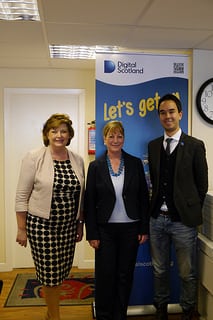Digital
Digital Participation: A National Framework for Local Action
April 29, 2014 by admin No Comments | Category Digital Scotland
On 24 April, Fiona Hyslop, Cabinet Secretary for Culture and External Affairs, launched the digital participation strategy at Pilton Equalities Project (PEP) in Edinburgh and spent some time chatting with members of the Computer Club to hear how getting online has been beneficial for them. The enthusiasm from everyone in room for digital technology was a highlight of the visit. PEP provides a range of services, including digital literacy classes, for older people and other vulnerable adults in North Edinburgh.
The strategy is based on a partnership-led movement with communities, businesses, voluntary organisations and the public sector to identify projects and embed best practice throughout Scotland. Our actions will remove barriers that are hindering people from becoming active digital citizens.
Improving levels of digital participation is an essential element of Scotland’s digital future. The National Framework for Local Action, combined with the Digital Participation Charter, will drive actions to help people get online and achieve our ambition to become a world class digital country.

Photo shows Fiona Hyslop, Helen Tait and Chris Yiu at the launch of the digital participation strategy at Pilton Equalities Project.
Our approach to opening up the benefits of the internet for everyone will take inspiration from the model seen at PEP. A network of community digital hubs across the country will provide access to training and support for anyone who wishes to develop their skills to make the most of the internet.
Community Digital Hubs
The network of community digital hubs will be coordinated by the Scottish Council for Voluntary Organisation (SCVO) to provide access to the web with support from trained tutors. We understand that each person has their own individual motivations for getting online; whether to communicate with friends and relatives or search for richer sources of information to deepen the enjoyment of hobbies. To support access to training, a database of classes covering a wide range of topics has been published at http://slic.digitalscotland.org/. The database signposts local access points where training is provided in various settings including libraries, and community centres. This is the first phase of the database and content will be expanded in the months ahead.
The next stage of our work on digital skills is to define progression routes for learners to develop more advanced abilities and achieve qualifications to help with finding a job or a place at college.
Our approach also recognises the essential contribution of workplace learning. All signatories of the Digital Participation Charter are committed to provide workforce training to ensure all their employees in Scotland have basic digital literacy skills. Joint working with Scottish Union Learning will specifically address training for those workers who don’t need to use technology for their jobs. Workplace learning will help this hard to reach group improve their skills by offering short sessions on the practical benefits of using the internet.
Tackling inequalities
We are making good progress with putting in place the infrastructure to allow people to be digitally connected. However the real benefits of the internet can only be realised if Scotland has a digitally confident, creative and skilled population to make full use of the connectivity.
The National Digital Participation Framework for Local Action aims to ensure that we take all the opportunities that technology offers to tackle deep rooted social and economic inequalities. In an increasingly interactive world, we cannot allow barriers to getting online stop people from accessing public services, taking part in civil society or making savings on their bills. This framework draws on the experiences and enthusiasms of those who have embraced the internet and supports others to do the same.

Leave a comment